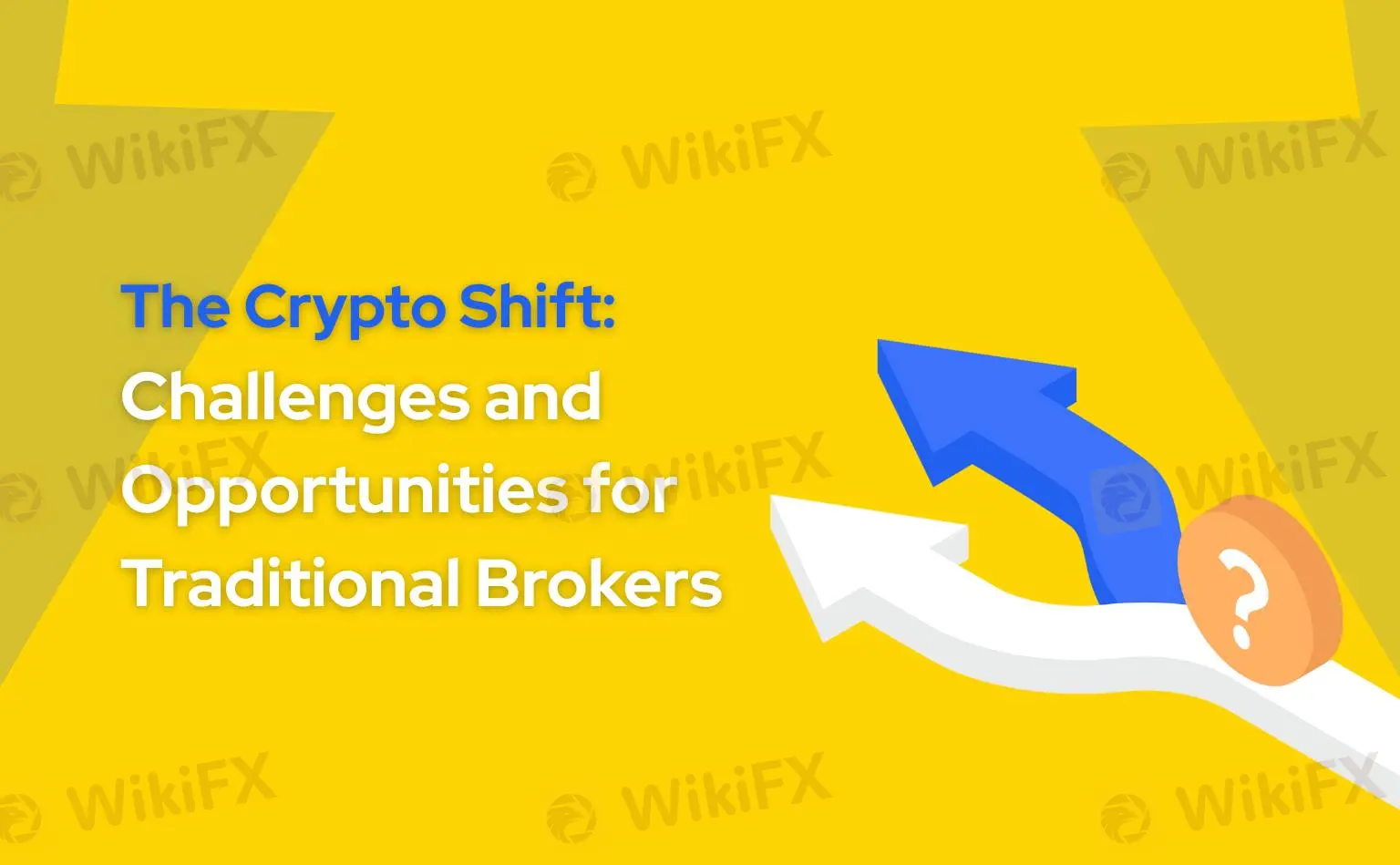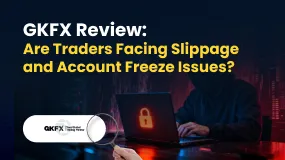简体中文
繁體中文
English
Pусский
日本語
ภาษาไทย
Tiếng Việt
Bahasa Indonesia
Español
हिन्दी
Filippiiniläinen
Français
Deutsch
Português
Türkçe
한국어
العربية
The Crypto Shift: Challenges and Opportunities for Traditional Brokers
Abstract:Crypto exchanges are expanding into traditional asset classes like forex and commodities, blurring the lines with traditional brokers. Meanwhile, few brokers, like eToro, have successfully integrated crypto into their platforms, revealing both the opportunities and the challenges ahead.

The boundary between cryptocurrency exchanges and traditional financial brokers is becoming increasingly blurred. As major exchanges expand into offering forex, commodities, and derivatives, and traditional brokers begin incorporating cryptocurrencies into their product suites, a convergence in trading services is underway. This evolving landscape is reshaping competition, forcing both sides to adapt their strategies in a rapidly digitalizing financial market.
Crypto Exchanges: Expanding Beyond Digital Assets
Cryptocurrency exchanges have moved decisively beyond their original focus on Bitcoin and altcoins. Platforms such as Coinbase, Kraken, and OKX have secured MiFID II licenses, enabling them to operate within traditional financial frameworks across Europe. Their ambitions extend far beyond crypto spot trading. By offering futures, options, and central limit order book (CLOB) services, exchanges are positioning themselves as full-spectrum financial hubs. Their unified wallets are designed to support multi-asset trading—spanning crypto, FX, equities, and commodities—offering users a seamless, borderless experience. With a strong foundation in technology, massive user bases, and an aggressive approach to regulatory compliance, these exchanges are setting a fast pace that traditional brokers may find difficult to match.
Brokers Attitudes Toward Crypto
In contrast, traditional FX and CFD brokers have shown a more cautious approach. Many still perceive crypto as volatile or speculative, integrating it only as an auxiliary offering rather than a core service. However, one exception stands out: eToro. Unlike its peers, eToro treated crypto as an essential part of its platform early on. As of 2024, it supports over 100 cryptocurrencies, seamlessly integrated alongside stocks, ETFs, and commodities. This strategic move paid off handsomely—eToro reported $931 million in total commissions in 2024, with crypto accounting for approximately 38% ($354 million) of that figure. Its net profit surged to $192 million, a significant increase compared to the previous year. eToro‘s success demonstrates that embracing crypto is not merely about adding new assets; it requires genuine integration into the platform’s DNA to meet the evolving demands of modern traders.
The Challenges for Brokers Transitioning to Crypto
Despite growing interest, the road to meaningful crypto adoption remains steep for most traditional brokers. A significant barrier lies in outdated technology infrastructures. Many brokers still rely heavily on MetaTrader 4 and 5, platforms built for forex and CFDs but ill-suited for blockchain-based assets. These systems lack native wallet integration, blockchain connectivity, and Web3 compatibility. Adapting to crypto markets is not just about offering Bitcoin trading; it demands reengineering trading platforms, upgrading compliance frameworks, and developing new customer engagement models that resonate with the crypto-native community. Furthermore, entering the crypto space requires a mindset shift—embracing transparency, decentralization, and continuous innovation. For brokers deeply entrenched in traditional finance models, overcoming both technological and cultural hurdles will be the true test of survival in a financial world increasingly shaped by the crypto revolution.
Disclaimer:
The views in this article only represent the author's personal views, and do not constitute investment advice on this platform. This platform does not guarantee the accuracy, completeness and timeliness of the information in the article, and will not be liable for any loss caused by the use of or reliance on the information in the article.
Read more

Seacrest Markets Exposed: Are You Facing Payout Denials and Spread Issues with This Prop Firm?
Seacrest Markets has garnered wrath from traders owing to a variety of reasons, including payout denials for traders winning trading challenges, high slippage causing losses, the lack of response from the customer support official to address withdrawal issues, and more. Irritated by these trading inefficiencies, a lot of traders have given a negative review of Seacrest Markets prop firm. In this article, we have shared some of them. Take a look!

GKFX Review: Are Traders Facing Slippage and Account Freeze Issues?
Witnessing capital losses despite tall investment return assurances by GKFX officials? Do these officials sound too difficult for you to judge, whether they offer real or fake advice? Do you encounter slippage issues causing a profit reduction on the GKFX login? Is account freezing usual at GKFX? Does the United Kingdom-based forex broker prevent you from accessing withdrawals? You are not alone! In this GKFX review guide, we have shared the complaints. Take a look!

Is Seaprimecapitals Regulated? A Complete Look at Its Safety and How It Works
The straightforward answer to this important question is no. Seaprimecapitals works as a broker without proper regulation. This fact is the most important thing any trader needs to know, because it creates serious risks for your capital and how safely the company operates. While this broker offers some good features, like the popular MetaTrader 5 platform and a low starting deposit, these benefits cannot make up for the major risks that come from having no real financial supervision. This article will give you a detailed, fact-based look at Seaprimecapitals regulation, what the company claims to do, the services it provides, and the clear differences between official information and user reviews. Our purpose is to give you the information you need to make a smart decision about the risks and benefits of working with this company.

Europol Cyber-Patrol Week Targets $55M Crypto Piracy
Europol’s Cyber-Patrol Week exposed $55M in illicit crypto tied to IPTV piracy, disrupting sites and strengthening EU intellectual property enforcement.
WikiFX Broker
Latest News
IEXS Review 2025: A Complete Expert Analysis
IEXS Regulation: A Complete Guide to Its Licenses and Safety Warnings
【WikiEXPO Global Expert Interviews】Ashish Kumar Singh: Building a Responsible and Interoperable Web3
CySEC Flags 21 Unauthorized Broker Websites in 2025 Crackdown
CQG Partners with Webull Singapore to Power the Broker’s New Futures Trading Offering
WinproFx Withdrawal Problems: A Complete Look at Delays and User Reports
Factory Orders Data Show Rebound In August
Interactive Brokers Expands Access to Taipei Exchange
Simulated Trading Competition Experience Sharing
WinproFx Regulation: A Complete Guide to Its Licensing and Safety for Traders
Currency Calculator



